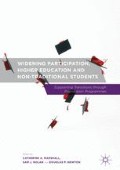Abstract
English, as it is used for academic purposes, can present problems for students whose educational background is not of a conventional nature. This chapter explores some common issues faced by students during their foundation year. It highlights some innovative, blended learning approaches used to support the often thorny development of a student’s personal academic voice.
Access this chapter
Tax calculation will be finalised at checkout
Purchases are for personal use only
References
Alsop, S., & Nesi, H. (2009). Issues in the development of the British Academic Written English (BAWE) corpus. Corpora, 4(1), 71–83.
Berkenkotter, C., Hukin, T., & Ackerman, J. (1991). Social context and socially constructed texts: The initiation of a graduate student into a writing research community. In C. Bazerman & J. Paradis (Eds.), Textual dynamics of the professions (pp. 191–215). Madison: The University of Wisconsin Press.
Brinko, K. T. (1993). The practice of giving feedback to improve teaching: What is effective? The Journal of Higher Education, 64(5), 574–593. JSTOR [Online] Available at: http://www.jstor.org/stable/2959994. Accessed 04 April 2013.
Cassels, J., & Johnstone, A. (1983). The meaning of words and the teaching of chemistry. Education in Chemistry, 20, 10–11.
Coxhead, A. (2000). A new academic word list. TESOL Quarterly, 34, 213–238.
Drury, H., & Webb, C. (1991). Literacy at tertiary level: Making explicit the writing requirements of a new culture. Paper presented at the Inaugural Systematic Linguistics Conference, Deakin University.
Flowerdew, J. (1993). Concordancing as a tool in course design. System, 21, 231–244.
Freedman, A. (1987). Learning to write again: Discipline specific writing at university. Carleton Papers in Applied Language Studies, 4, 45–65.
Gardner, R. P. L. (1972). Words in science. Victoria: Australian Science Education Project.
Hyland, K., & Tse, P. (2007). Is there an academic vocabulary? TESOL Quarterly, 41(2), 235–253.
Johns, T. F. (1991). Should you be persuaded: Two examples of data-driven learning. In T. F. Johns & P. King (Eds.), Classroom concordancing (pp. 1–13). Birmingham: ELR.
Johnstone, A. H., & Selepeng, D. (2001). A language problem revisited. Chemistry Education: Research and Practice in Europe, 2, 19–29.
Kenstowicz, M. (1994). Phonology in generative grammar. Oxford: Blackwell.
Laurillard, D. (2002). Rethinking university teaching. London: Routledge.
Mudraya, O. (2006). Engineering English: A lexical frequency instructional model. English for Specific Purposes, 25, 23–56.
Nathan, P. (2013). Academic writing in the business school: The genre of the business case report. Journal of English for Academic Purposes, 12(1), 57–68. Available at http://www.sciencedirect.com/science/article/pii/S1475158512000768. Accessed 01 September 2014.
Nation, I. S. P. (1990). Teaching and Learning Vocabulary. Boston: Heinle & Heinle.
Nation, I. S. P. (2001). Learning vocabulary in another language. New York: CUP.
November, N., & Day, K. (2012). Using undergraduates’ digital literacy skills to improve their discipline-specific writing: A dialogue. International Journal for the Scholarship of Learning and Teaching, 6(2), 1–21.
Pickersgill, S., & Lock, R. (1991). Student understanding of selected non‐technical words in science. Research in Science & Technological Education, 9, 71–79.
Pozo, J., & Lorenzo, M. (2009). Representing organic molecules: The use of chemical languages by university students. In C. Andersen, N. Scheuer, M. P. Perez Echeverria, & T. Ev (Eds.), Representational systems and practices as learning tools. Rotterdam: Sense Publishers.
Race, P., & Pickford, R. (2007). Making teaching work. London: Sage.
Ramsden, P. (1992). Learning to teach in higher education. London: Routledge.
Rees, S. W., & Bruce, M. (2012). The development of online resources to enhance understanding of subject specific language in non-traditional students. 12th Annual Durham Blackboard Users’ Conference, Durham University, January 2012.
Rincke, K. (2011). It’s rather like learning a language: Development of talk and conceptual understanding in mechanics lessons. International Journal of Science Education, 33, 229–258.
Schmitt, D., & Schmitt, N. (2005). Focus on vocabulary: Mastering the academic word list. London: Longman.
Song, Y., & Carheden, S. (2014). Dual meaning vocabulary words (DMW) in learning chemistry. Chemistry Education Research and Practice, 15, 128–141.
Sowton, C. (2012). 50 steps to improving your academic writing. Reading: Garnet Education.
Swales, J. M. (1990). Genre analysis: English in academic and research settings. Cambridge: Cambridge University Press.
Swales, J. M., & Feak, C. B. (2004). Academic writing for graduate students (2nd ed.). Ann Arbor: University of Michigan Press.
Tribble, C. (1997). Improvising corpora for ELT: Quick-and-dirty ways of developing corpora for language teaching. In J. Melia & B. Lewandowska -Tomaszczyk (Eds.), PALC 1997 proceedings. Lodz: Lodz University Press. Retrieved from http://www.ctribble.co.uk/text/Palc.htm. Accessed 5 February 2013.
Trimble, L. (1985). English for science and technology: A discourse approach. Cambridge: Cambridge University Press.
Wellington, J. J., & Osborne, J. (2001). Language and literacy in science education. Buckingham: Open University Press.
Wenger, E. C. (1998). Communities of practice: Learning, meaning and identity. New York/Cambridge: Cambridge University Press.
Woodward-Kron, R. (2004). Discourse communities and writing apprenticeship: An investigation of these concepts in undergraduate education students’ writing. Journal of English for Academic Purposes, 3, 139–161.
Worthington, D., & Nation, I. S. P. (1996). Using texts to sequence the introduction of new vocabulary in an EAP course. RELC Journal, 27(2), 1–11.
Author information
Authors and Affiliations
Editor information
Editors and Affiliations
Copyright information
© 2016 The Author(s)
About this chapter
Cite this chapter
Bruce, M., Rees, S., Wilson, J. (2016). Language Issues Facing Non-Traditional Students: Some Problems and Solutions. In: Marshall, C., Nolan, S., Newton, D. (eds) Widening Participation, Higher Education and Non-Traditional Students. Palgrave Macmillan, London. https://doi.org/10.1057/978-1-349-94969-4_3
Download citation
DOI: https://doi.org/10.1057/978-1-349-94969-4_3
Published:
Publisher Name: Palgrave Macmillan, London
Print ISBN: 978-1-349-94968-7
Online ISBN: 978-1-349-94969-4
eBook Packages: EducationEducation (R0)

